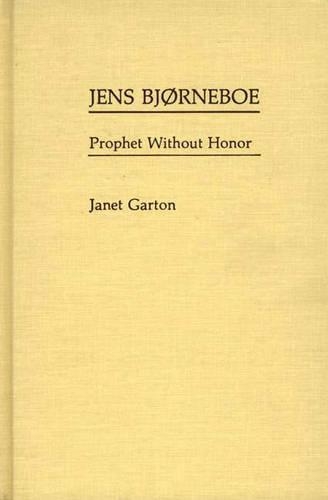
Jens Bjorneboe: Prophet Without Honor
(Hardback)
Publishing Details
Jens Bjorneboe: Prophet Without Honor
By (Author) Janet Garton
Bloomsbury Publishing PLC
Praeger Publishers Inc
19th August 1985
United States
Classifications
Tertiary Education
Non Fiction
Literary studies: general
813
Physical Properties
Hardback
184
Width 156mm, Height 235mm
510g
Reviews
Bjorneboe (1920-76), controversial Norwegian poet, dramatist, essayist, (anti-) novelist, and lifelong rebel, saw authority as always and everywhere repressive. His rebellion shocked his contemporaries, and it increased with his obsession over mankind's inhumanity, whose cruelty he saw as expressing an innate, divinely initiated evil. Garton, lecturer at East Anglia, prefaces a chronology covering Bjorneboe's life to chapters on his career, essays, and polemics; she illustrates his poetry and Brechtian lyrics with translations, then analyzes the novels thematically (emphasizing protocols like Moment of Freedom. An annotated selective bibliography includes English reviews and translations of his works. Garton's restrained study is strangely at odds with her subject's pain and passion. And she does not deal with the more controversial hypotheses about Bjorneboe's obsessions or with the contrast between his final vision of Ragnarok, followed by an anarchistic utopia of good men, and his final depression, followed by suicide. Nevertheless, her study is reasonably and carefully composed. Appropriate for upper-division undergraduates, graduate students, and general readers.-Choice
"Bjorneboe (1920-76), controversial Norwegian poet, dramatist, essayist, (anti-) novelist, and lifelong rebel, saw authority as always and everywhere repressive. His rebellion shocked his contemporaries, and it increased with his obsession over mankind's inhumanity, whose cruelty he saw as expressing an innate, divinely initiated evil. Garton, lecturer at East Anglia, prefaces a chronology covering Bjorneboe's life to chapters on his career, essays, and polemics; she illustrates his poetry and Brechtian lyrics with translations, then analyzes the novels thematically (emphasizing protocols like Moment of Freedom. An annotated selective bibliography includes English reviews and translations of his works. Garton's restrained study is strangely at odds with her subject's pain and passion. And she does not deal with the more controversial hypotheses about Bjorneboe's obsessions or with the contrast between his final vision of Ragnarok, followed by an anarchistic utopia of good men, and his final depression, followed by suicide. Nevertheless, her study is reasonably and carefully composed. Appropriate for upper-division undergraduates, graduate students, and general readers."-Choice
